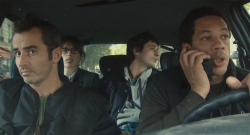Reviews
Michael Winterbottom
UK, 2012
Credits
Review by Victoria Large
Posted on 22 June 2012
Source 35mm print
Categories The 2012 Independent Film Festival Boston
Literary adaptations are a tricky and fascinating breed, by their nature raising vexed questions of whether fidelity to the original text is important, and indeed, what fidelity to the original text even means. It is perhaps unsurprising, then, that a daring, divisive director like Michael Winterbottom is so frequently drawn to adaptations. Trishna, Winterbottom’s third adaptation of a Thomas Hardy novel, is a take on Tess of the d’Urbervilles that’s loaded with risks, big changes that nevertheless amount to a worthy attempt to capture what film theorist André Bazin would call the “spirit” - rather than the exact letter - of the novel on which it is based.
The changes to the setting are evident immediately: the film’s opening sequence finds a group of British tourists tearing through a rural Indian landscape in a Jeep, blasting Kasabian’s “Shoot the Runner.” Winterbottom has moved the action from nineteenth century England to twenty-first century India and transformed Hardy’s innocent peasant girl Tess into the equally poor and inexperienced Trishna. He has also conflated two of the novels’ major characters - Alec d’Urbervilles and Angel Clare, the men who separately bring about Tess’ ultimate ruin - into Jay, the handsome scion of a hotel magnate. And while, as other critics have noted, the shift to India acts in large part to preserve and underscore the restrictions and double standards attached to gender and class that so torture Hardy’s heroine; the merging of Alec and Angel into Jay significantly reshapes the novel’s narrative.
Hardy’s Tess meets the man she loves only after she has been violated by a man that she despises, but Winterbottom’s Trishna is allowed the thrills of what seems, if only briefly, like a fairy tale romance. When Jay rescues Trishna from harm, scooping her onto his motorcycle and telling her, “You can hold onto me,” the moment is exhilarating. Even when the fairy tale comes crashing down with an unwanted pregnancy, and then with deception, coldhearted power plays, and stunning violence, we know full well why our heroine dared to hope.
Indeed, with Trishna Winterbottom demonstrates a particular skill at engineering powerful changes in mood, setting his audience on edge. Shifts from the countryside of Rajasthan to dense, urban Mumbai, as well as distinctive changes to the film’s score and the character’s costuming throughout, make for a film with an engrossingly rich and varied texture. It’s true that even with some significant streamlining of the hefty novel’s plotting, Trishna still has something of an unusual and unhurried sense of pace, but there’s also genuine appeal in its titanic sense of ambition and its epic sweep.
On the other hand, in updating, relocating, and remixing Tess of the d’Urbervilles, Winterbottom does inevitably lose some of the story’s nuance. Though Frieda Pinto and Riz Ahmed do solid work and have convincing chemistry as Trishna and Jay, they are also tasked with very difficult roles. Trishna’s passivity and Jay’s drastic behavioral changes are especially jarring elements. I suspect that while Winterbottom offers a bold and thoughtful reading of Hardy’s novel (I can already picture sumptuous stills from Trishna reproduced in someone’s college textbook), and one that will doubtlessly send viewers back to the source material, his reinterpretation may not quite be able to stand on its own.
But to go back to Bazin, the elusive “spirit” of the novel, particularly its strong element of social critique, is transformed but still vitally present in this film. That’s especially true of Winterbottom’s depiction of modern media. Idealized romance and commercialized sex seep out of the television sets in the film, yet Trishna’s real life sexual relationship carries a strong social stigma in her village. Sex is, troublingly, both omnipresent and taboo. It could be argued that there’s something problematic about Winterbottom, a British director, critiquing a society that he doesn’t belong to, but while the film is set in India, I would contend that the western world’s own ambivalent treatment of sex is coming under implicit critique here as well.
Winterbottom succeeds in pointing up the ongoing relevance of Hardy’s text, which means, given the novel’s deeply tragic bent, that Trishna makes for unapologetically disturbing viewing. In fact, while Hardy’s novel concludes with a sliver of hope, Winterbottom’s alterations allow for no such possibilities; the film leaves us bereft. Most festival screenings are met with a round of applause when a film’s credits begin to roll, but the theater was silent after Trishna’s brutal denouement. I took this less as an indictment of the film’s quality than an indication that what had just unspooled required some serious thought and digestion, and to my mind, that’s a wonderful mood for any work of art to inspire. Winterbottom is not always an easy director to handle, and that’s one of the things that recommends him most.
More The 2012 Independent Film Festival Boston
-

Beauty is Embarrassing
2012 -

Gregory Crewdson: Brief Encounters
2012 -

Sleepwalk with Me
2012 -

Liberal Arts
2010 -

Burn
2012 -

All-Ages: The Boston Hardcore Film
2012 -

Polisse
2011 -

Sun Don’t Shine
2012 -

Headhunters
2011 -

Cerro Rico, Tierra Rica
2011 -

Time Zero: The Last Year of Polaroid Film
2011 -

Jason Becker: Not Dead Yet
2012 -

Detropia
2012 -

Girl Model
2011 -

Under African Skies
2012 -

The Central Park Effect
2012 -

Paul Williams: Still Alive
2011 -

Trishna
2012 -

The Queen of Versailles
2012
We don’t do comments anymore, but you may contact us here or find us on Twitter or Facebook.



